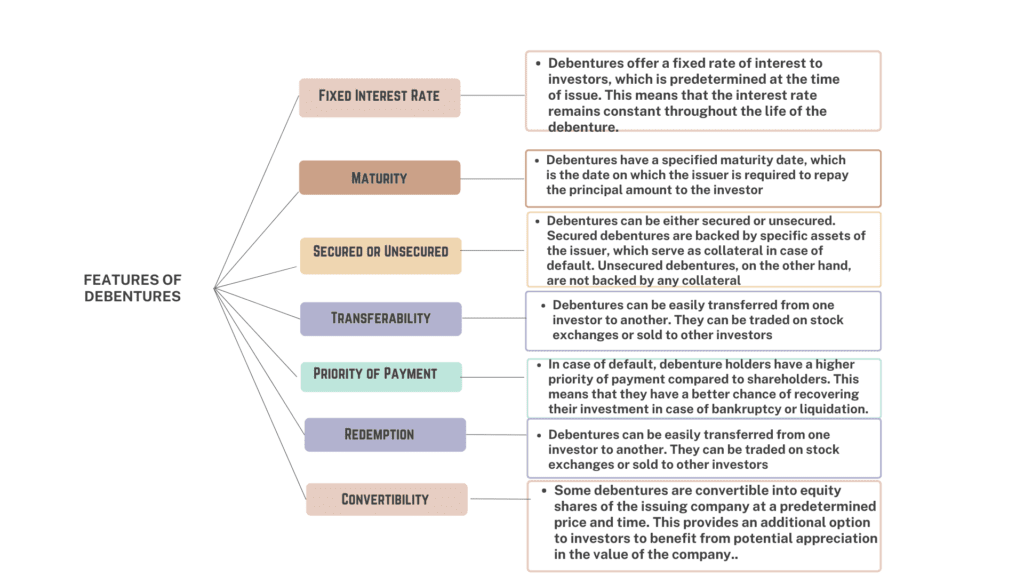
If you are looking to buy debentures, make sure you understand the key features of credit rating and taxation before investing. Credit rating of debentures and taxation on it plays an important role to make an informed decision before buying a Debentures. In this article, we’ll break down everything you need to know about credit rating and taxation on debentures, so you can get the most out of your investment.
Role of Credit Rating Agencies in Debenture Issuance
Credit rating agencies assess creditworthiness of issuers, impacting interest rates and demand for debentures.
The primary role of credit rating agencies in debenture issuance can be summarized as follows:
- Assessment of creditworthiness: Credit rating agencies analyze an organization’s financial performance, debt, and market position. They then assign a credit rating. The rating reflects the chance of default on the debentures.
- Market credibility: These agencies are credible due to expertise and reputation. Investors rely on ratings for informed decisions and risk assessment. Ratings agencies have high credibility in the market. Credit ratings inform investment decisions and risk evaluation.
- Pricing: Credit rating affects debenture pricing. Higher rating typically means lower interest and vice versa.
- Marketing: These agencies can market debentures with their ratings. They create awareness about issuing organization’s creditworthiness. Ratings provided by agencies help attract potential investors. Credit rating agencies aid debenture marketing efforts. Issuers benefit from agencies’ creditworthiness assessments.
- Ongoing monitoring: They monitor creditworthiness over time, and adjust ratings based on performance.
Taxation on Debenture Interest
Taxation on debentures varies by country and investor residency. Foreign debenture investment may have dual taxation. Be cautious of tax implications as it impacts returns. Seek advice from a tax professional.
US interest income from debentures is taxable federally, and also by state and local taxes. Debenture holders report this on their tax returns. The tax rate depends on their total income. Debentures can be tax-exempt. Interest income won’t have federal income tax. Limits and rules apply. Often issued by governments or non-profits.
Debentures and Corporate Finance
Debentures help organizations raise capital. They fund expansion plans, refinancing debt. Advantages include lower interest rates and flexible repayment terms. They are typically issued through a public offering or a private placement and are sold to investors, such as institutional investors, mutual funds, or individual investors. The proceeds from the debenture issuance can be used by the organization for various purposes, including funding capital projects or paying off existing debt.
The issuing organization negotiates debenture terms with investors. Investors consider interest rate, repayment period, and collateral. Interest rate is based on creditworthiness and market conditions.
Debentures offer capital access and diversify funding sources, reducing reliance on loans.
Evaluate risks before issuing debentures, as they carry fixed obligations and credit risk.
Debentures and Risk Management
Debentures help organizations manage risk by diversifying funding sources.Issuing debentures reduces dependence on bank loans, mitigating risks.Organizations use debentures as an alternative financing source for diversification. Debentures can lower the risk of relying on a single funding source.
Debentures carry credit risk. Issuers can default. Credit rating agencies assess creditworthiness. They assign ratings based on assessment. Higher rating means lower credit risk. Lower interest rates result.
Debentures have interest rate risk. Interest rate changes affect the cost of servicing debentures. Organizations issue variable rate debentures or use interest rate swaps to manage this risk.
Organizations can manage debenture risk by evaluating financing needs and cash flow. They must understand debt servicing obligations and ensure timely payments. Cash reserves should be sufficient.
Debentures and Financial Markets
Debentures play an important role in financial markets as they provide an attractive investment option for investors seeking fixed-income securities. Debentures are often issued by corporations, governments, and other entities looking to raise capital through debt financing.
In financial markets, debentures are traded like other debt securities such as bonds and notes. Debentures can be bought and sold by investors on the open market, providing liquidity to the investment. This makes debentures an attractive option for investors who seek a fixed income stream and the ability to liquidate their investment when needed.
Debentures are also an important part of the bond market, which is a key component of the global financial system. The bond market is a market for trading debt securities such as government bonds, corporate bonds, and debentures. Investors can buy and sell these securities on the open market, and the prices of these securities are determined by supply and demand factors.
The issuance of debentures can also have an impact on the overall financial market, as it can affect interest rates and the supply of available funds for other investments. The interest rates on debentures are influenced by a variety of factors, including the creditworthiness of the issuing organization, market conditions, and inflation rates.
Debentures and Investors
Debentures are an attractive investment option for a wide range of investors, including institutional investors, retail investors, and high net worth individuals. Investors are attracted to debentures because they provide a fixed income stream, which can help to diversify their investment portfolios and reduce overall risk.
Institutional investors, such as pension funds, insurance companies, and mutual funds, are some of the largest investors in the debenture market. These investors are attracted to debentures because they offer a predictable income stream and can be a relatively safe investment option, particularly if the debentures are issued by a well-established and financially sound organization.
Retail investors and high net worth individuals also invest in debentures, often through mutual funds or exchange-traded funds (ETFs). These funds provide investors with exposure to a diversified portfolio of debentures, which can help to reduce risk and provide a steady income stream.
When investing in debentures, investors should carefully evaluate the creditworthiness of the issuing organization, the terms of the debentures, and the potential risks associated with the investment. The creditworthiness of the issuing organization can be evaluated by credit rating agencies, which assign ratings to debentures based on the organization’s financial strength and ability to repay its debt obligations.
Debentures and Capital Market Development.
Debentures can play a significant role in the development of capital markets, particularly in emerging economies or in countries where the capital markets are less developed. Capital markets are an essential component of the global financial system, as they provide a mechanism for companies to raise capital, investors to diversify their portfolios, and governments to finance their operations.
Debentures are one of the ways in which companies and governments can raise capital in the capital markets. By issuing debentures, these organizations can tap into a pool of investors seeking fixed-income securities, which can provide a reliable source of funding for their operations or projects.
The issuance of debentures can also help to develop the capital markets by creating new investment opportunities for investors. As more organizations issue debentures, investors have a wider range of investment options, which can help to diversify their portfolios and reduce overall risk.
Furthermore, the development of a robust debenture market can help to improve the overall efficiency of the capital markets. By providing a mechanism for companies and governments to raise capital more easily, the debenture market can help to reduce the cost of capital and increase the availability of funds for other investments.
In addition, the development of a vibrant debenture market can also have a positive impact on the wider economy. By providing companies and governments with a reliable source of funding, debentures can help to finance projects that create jobs and stimulate economic growth.
Additional resources that can help you in investing in debentures.
You can also visit these websites that provide details about how to invest in debentures:
- Securities and Exchange Board of India (SEBI) – https://www.sebi.gov.in/
- National Stock Exchange (NSE) – https://www.nseindia.com/
- Bombay Stock Exchange (BSE) – https://www.bseindia.com/
- Reserve Bank of India (RBI) – https://www.rbi.org.in/
- India Infoline (IIFL) – https://www.indiainfoline.com/
- Angel Broking – https://www.angelbroking.com/
- Kotak Securities – https://www.kotaksecurities.com/
- HDFC Securities – https://www.hdfcsec.com/
- ICICI Direct – https://www.icicidirect.com/
- Zerodha – https://zerodha.com/
Conclusion
In conclusion, when it comes to buying debentures, understanding credit rating and taxation is crucial. A higher credit rating generally indicates lower risk, while taxation can significantly impact your returns. It’s important to do your research and carefully evaluate each investment opportunity to ensure you make the best decision for your financial goals. By considering the key features of credit rating and taxation on debentures, you can make an informed decision and maximize your investment returns.
Where can I find more about Debentures?
We have created a separate post on debentures, please visit.




